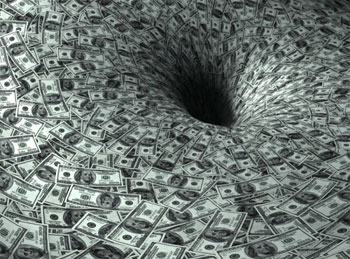 Add more money.
Add more money.
The Wall Street Journal notes the Institute for New Economic Thinking was launched last year with $50 million from financier and theorist George Soros. The institute so far has approved funding for more than 27 projects, including efforts by aimed at developing new ways to model the economy. What are their ideas? Remember that Soros’ Alchemy of Finance presented the big idea that prices are irrational, which he defined as biased ‘in one direction or another’ (his other idea, that markets can influence what they predict, playing off his role in the 1992 EMU crisis). He’s sympathetic to researchers who would confirm he’s not just rich, but a profound, original thinker. Here’s the WSJ:
The problem, says Doyne Farmer, is that the models bear too little relation to reality. People aren’t quite as rational as models assume, he says. Advocates of traditional economics acknowledge that not all decisions are driven by pure reason.
…
His proposal: Create a richly complex, computer-based simulation of the economy like those scientists use to model weather patterns, epidemics and traffic. Given enough computing power, such “agent-based” models can include millions of individual players, who don’t have to be rational or agree with one another. Instead of equations that must be solved, the players have open-ended rules of behavior, such as, “If I’ve just turned 55 and I’m feeling blue, I’ll buy a sports car.”
Gee, macro models with lots of equations…hey, that was popular in the 1970s! Jan Tinbergen made the first one in the 1950s. They did not stop using them because they ran out of funding, but rather because they were such an obvious failure. With hundreds of equations based on mini-models of banking, savings, or industry behavior they predicted the past very well, but the future, not so much. Robert Lucas showed these models were internally inconsistent, in that the modelers assumed people would have, say, inflation expectations of 2% while the model implied 4%. Now, this is kind of tempting when applying models to real data, because data is historical, and with the benefit of hindsight, people are biased in one way or another. The problem is, at any one time we don’t know which way. Chris Sims showed that much simpler vector auto regressions could predict just as well. By the late 80’s these macro models were anachronisms, and the only purveyors are economists over 50, and global climate modelers.
Now, Doyne Farmer has been working on this problem for 20 years, and it’s very naive to think all he needs is 10 million dollars and the resulting CPU to cleanly break out of the macroeconomic cul de sac. The idea now is to add new irrationalities, with a hat tip to Kahneman’s behavioralist approach. The problem, again, is that irrationalities tend to explain everything, via too much anchoring or lack of base weighting, over-reaction and under-reaction.
The idea that adding new ‘behavioralist’ equations to the old macro modeling approach is naive because the old approach had hundreds of equations–assumptions about causal relations. Economists are very good at rationalizing behavior, so if some random assumption worked within this paradigm some economist would have accidentally found it the way the momentum effect was found in equity returns. Hundreds, if not thousands, of really bright people looked at this problem for decades, and then retired, and their interns eventually all decided to not follow them to obscurity.
Anything that works can be modeled as rational via clever theorizing; there are very few constraints on the equations in large-scale macro models. In that sense, irrationality with a complex model of this-causes-that is not ‘new’. You are going to need something more specific.
- Bulenox: Get 45% to 91% OFF ... Use Discount Code: UNO
- Risk Our Money Not Yours | Get 50% to 90% OFF ... Use Discount Code: MMBVBKSM
Disclaimer: This page contains affiliate links. If you choose to make a purchase after clicking a link, we may receive a commission at no additional cost to you. Thank you for your support!


The real problem is that the original meaning of rational was intelligent but now it has turned into correct. There is a big difference between being intelligent and being correct. It’s why chess is a competitive sport.